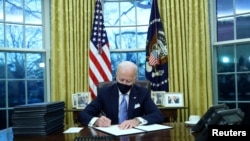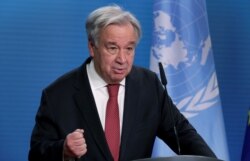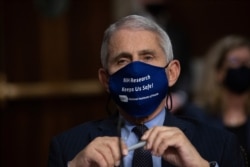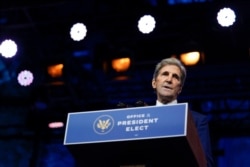Among the 17 executive actions U.S. President Joe Biden signed during his first hours in office Wednesday, two will strengthen frayed cooperation with the United Nations on boosting global health and combating climate change.
Making good on campaign promises, Biden halted the U.S. withdrawal from the World Health Organization and rejoined the 2015 Paris Climate Accord.
"I am committed to working closely with President Biden and other leaders to overcome the climate emergency, and recover better from COVID-19," U.N. Secretary-General Antonio Guterres said in a statement welcoming the actions.
In mid-April last year, as the coronavirus pandemic was spreading across the globe, then-president Donald Trump cut off U.S. funding to the WHO, saying it was "virtually controlled by China." He then went further, triggering the process to pull the U.S. completely out of the organization. The withdrawal was due to go into effect in July, but Biden's order will cancel it.
The WHO's Executive Board has been meeting virtually this week, and the Biden administration announced that a U.S. delegation, headed by Dr. Anthony Fauci, will participate. The administration has also said it will join Covax, an international alliance dedicated to equitable access to and distribution of the COVID-19 vaccine, especially in poorer countries.
There have been more than 96 million confirmed cases of COVID-19 worldwide and more than 2 million deaths, according to Johns Hopkins University, which tracks the data. About a quarter of the cases and one-fifth of the deaths have been in the United States.
"Supporting the WHO is absolutely critical to the world's efforts for a better coordinated response against COVID-19," U.N. spokesman Stephane Dujarric said. "Now is the time for unity and for the international community to work together in solidarity to stop this virus and its shattering consequences."
Climate action
Sitting at his desk in the Oval Office, Biden also signed the instrument to rejoin the Paris Agreement, which Trump withdrew from in 2017, saying it was "in America's economic interest to do so." The former president was a supporter of the fossil fuel industry and often mocked clean renewable forms of energy, such as wind.
Once the instrument is deposited at the United Nations, the U.S. will officially become a party to the accord in 30 days.
The 2015 climate agreement, signed by virtually every country in the world, aims to reduce global greenhouse gas emissions and limit the planet's temperature increase during this century to 2 degrees Celsius, while working to limit the increase even further to 1.5 degrees.
Biden has also appointed former Secretary of State John Kerry as the United States' first presidential envoy on climate and made him a part of his National Security Council.
"Following last year's Climate Ambition Summit, countries producing half of global carbon pollution had committed to carbon neutrality," U.N. chief Guterres said. "Today's commitment by President Biden brings that figure to two-thirds. But there is a very long way to go."
Guterres said he looks forward to U.S. leadership to accelerate global efforts toward net zero emissions, including with ambitious 2030 targets and climate finance ahead of the next climate review conference in November.
U.N. spokesman Dujarric said that Guterres is sending a congratulatory letter to Biden and Vice President Kamala Harris, and that he looks forward to working with them.
"It is going to be, I think, a very active and positive engagement between the secretary‑general and this new administration," Dujarric told reporters.




